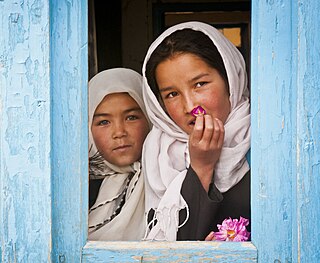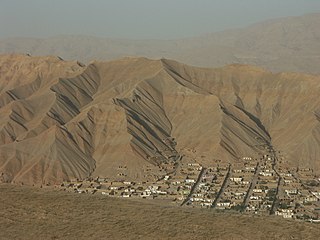Hafizullah Emadi is an Afghan author, independent scholar and works as a development consultant for international non-governmental organizations. Most recently, he lives in California and works in Kabul, Afghanistan.
Hafizullah Emadi is an Afghan author, independent scholar and works as a development consultant for international non-governmental organizations. Most recently, he lives in California and works in Kabul, Afghanistan.
He was born in the Shibar District, Bamyan Province of Afghanistan.
After receiving his Doctor of Philosophy from the University of Hawaiʻi at Mānoa in 1988, [1] Emadi taught in the University of Hawaii system, joined the East-West Center's International Relations Program as a Fellow in 1990, and was awarded a fellowship at the Woodrow Wilson Center in 1999. [2]
He monitored the Afghanistan elections in 2004.[ where? ]
Emadi has written books and articles on Islamic and Middle Eastern politics and culture, including:
Published numerous articles on state, gender, modernization and nation-building in Eastern Europe, the Middle East and Central Asia. Examples of articles include:

The Hazaras are an ethnic group and a principal component of Afghanistan’s population. They are one of the largest ethnic groups in Afghanistan, primarily residing in the Hazaristan (Hazarajat) region in central Afghanistan. Hazaras also form significant minority communities in Pakistan, mainly in Quetta, and in Iran, primarily in Mashhad. They speak the Dari and Hazaragi dialects of Persian. Dari, also known as Dari Persian, is one of the two official languages of Afghanistan.

Baghlan is one of the 34 provinces of Afghanistan and located in northeastern Afghanistan. As of 2020, the province has a population of about 1,014,634.
The Nasher are a noble Afghan family and Khans of the Pashtun Kharoti (Ghilji) tribe. The family is originally from Qarabagh, Ghazni but founded modern day Kunduz in the early 20th century and lived there until the end of the Barakzai dynasty in the late 20th century.
Masuma Esmati-Wardak, was an Afghan writer and politician. She was jointly one of the first women to serve in the Afghan parliament in 1965, and served as Minister of Education in 1990-1992.

Current and past governments of Afghanistan have included a Minister of Justice in the Afghan cabinet.

Shia Islam in Afghanistan is practiced by a significant minority of the population. According to a 2021 Pew survey, 7% of Afghans followed Shia Islam, but other estimates have put the number as high as 20%. Afghanistan's Shia are primarily the Twelvers, while a minority are Ismailis.

Mohammad Nadir Shah was King of Afghanistan from 15 October 1929 until his assassination in November 1933. He became the king after his victory in the Afghan Civil War of 1928–29. Previously, he served as Minister of War, Afghan Ambassador to France, and as a general in the Royal Afghan Army. He and his son Mohammad Zahir Shah, who succeeded him, are part of the Musahiban.
Parliamentary elections were held in Afghanistan in August and September 1965. Members of the Senate were elected between 26 August and 7 September, and members of the House of the People between 10 and 26 September. Following the introduction of women's suffrage in the 1964 constitution, four women were elected to the House of People and two were appointed the Senate.

The Hazaras have long been the subject of persecution in Afghanistan, including enslavement during the 19th century and ethnic and religious persecution for hundreds of years. In the 20th and 21st centuries, they have also been the victims of massacres committed by the Taliban and al-Qaeda. Hazaras have been systemically killed and discriminated against socially, economically, and culturally with specific intent, argued by some to constitute genocide. The Hazaras primarily come from the central regions of Afghanistan, known as Hazarajat. Significant communities of Hazara people also live in Quetta, Pakistan and in Mashad, Iran, as part of the Hazara and Afghan diasporas.
As a geographically fragmented state, Afghanistan is separated into as many as 14 ethnic groups that have historically faced divisions that devolved into political violence. This conflict reached its culminating point in the 1990s with the rise of the Taliban.

Slavery in Afghanistan was present in the post-Classical history of Afghanistan, continued during the Middle Ages, and persisted into the 1920s.
Abdul Majid Kalakani also known as Majid Agha was an Afghan communist politician. He was the founder and leader of the Liberation Organization of the People of Afghanistan (SAMA).

Homeira Malikyar Seljuqi (1912–1990) was an Afghan politician. Alongside Aziza Gardizi, she was one of the first two female Senators nominated in 1965.
Aziza Gardizi was an Afghan politician. Alongside Homeira Seljuqi, she was one of the first two female Senators nominated in 1965.
Constitutional Assembly elections were held in Afghanistan in January 1977. The Constitutional Assembly was called to produce a new constitution four years after the coup that saw Mohammed Daoud Khan overthrow his cousin, King Mohammed Zahir Shah. The Assembly was part-elected and part-appointed.
Constitutional Assembly elections were held in Afghanistan in 1964. The Assembly produced the 1964 constitution, which introduced women's suffrage.
Anjuman-i Himayat-i-Niswan was a women's organization in Afghanistan, founded in 1928. It was the first women's organization in Afghanistan.
Princess Sahira Begum Siraj Al Banat or Bibi Gul, mostly known as just Seraj al-Banat, was a royal princess of Afghanistan.
Irshad-e Naswan was a women's magazine issued in Afghanistan founded in 1921 being the first women's magazine in the country. The magazine was founded by Queen Soraya Tarzi. It was founded as a part of the king and queen's modernization project to reform Afghan society, a policy which included the emancipation of women, and the Irshad-e Naswan as well as the first women's association Anjuman-i Himayat-i-Niswan were both founded to support the state feminism of the royal government.

Rawnaq Naderi also known as Sayed Nooruddin Rawnaq Naderi was a distinguished Afghan poet whose works have contributed significantly to Persian literature. As the son of Sayed Kayan, a prominent religious leader of the Afghanistan Ismailis, Naderi's upbringing was deeply influenced by a rich cultural and religious environment.